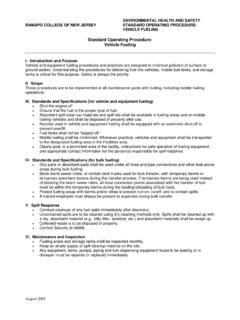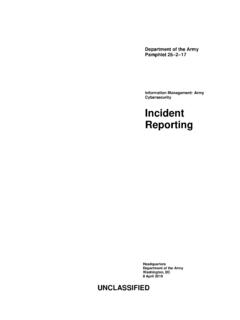Transcription of Writing Rubric Author’s Name Title of Piece
1 Writing Rubric Author s Name Title of Piece 1 Does Not Meet 2 Partially Meets 3 Does Not Fully Meet 4 Meets 5 More Than Meets 6 Exceeds CONTENT/IDEAS Writing is extremely limited in communicating knowledge, with no central theme. Writing is limited in communicating knowledge. Length is not adequate for development. Writing does not clearly communicate knowledge. The reader is left with questions. Writes related, quality paragraphs, with little or no details. Writing is purposeful and focused. Piece contains some details. Writing is confident and clearly focused. It holds the reader s attention. Relevant details enrich Writing . ORGANIZATION Writing is disorganized and underdeveloped with no transitions or closure. Writing is brief and underdeveloped with very weak transitions and closure. Writing is confused and loosely organized. Transitions are weak and closure is ineffective. Uses correct Writing format. Incorporates a coherent closure. Writing includes a strong beginning, middle, and end, with some transitions and good closure.
2 Writing includes a strong, beginning, middle, and end with clear transitions and a focused closure. VOCABULARY/ WORD CHOICE Careless or inaccurate word choice, which obscures meaning. Language is trite, vague or flat. Shows some use of varied word choice. Uses a variety of word choice to make Writing interesting. Purposeful use of word choice. Effective and engaging use of word choice. VOICE Writer s voice/ point of view shows no sense of audience. Writer s voice/ point of view shows little sense of audience. Writer s voice/ point of view shows that sense of audience is vague. Writer uses voice/point of view. Writes with the understanding of a specific audience. Writer has strong voice/ point of view. Writing engages the audience. Writes with a distinct, unique voice/point of view. Writing is skillfully adapted to the audience. SENTENCE FLUENCY Frequent run-ons or fragments, with no variety in sentence structure. Many run-ons or fragments. Little variety in sentence structure.
3 Some run-ons or fragments. Limited variety in sentence structure. Uses simple compound, and complex, sentences. Frequent and varied sentence structure. Consistent variety of sentence structure throughout. CONVENTIONS Parts of speech show lack of agreement. Frequent errors in mechanics. Little or no evidence of spelling strategies. Inconsistent agreement between parts of speech. Many errors in mechanics. Limited evidence of spelling strategies. Occasional errors between parts of speech. Some errors in mechanics. Some evidence of spelling strategies. Maintains agreement between parts of speech. Few errors in mechanics. Applies basic grade level spelling. Consistent agreement between parts of speech. Uses correct punctuation, capitalization, etc. Consistent use of spelling strategies. Uses consistent agreement between parts of speech. No errors in mechanics. Creative and effective use of spelling strategies.










